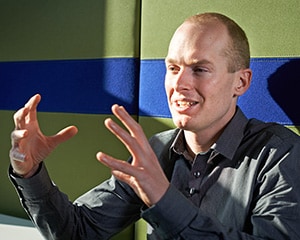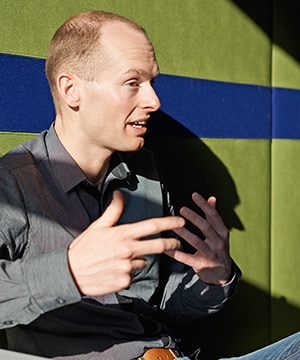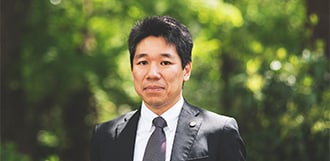
- Semiconductor Technology Now
Scientist Interview
Who will get one-way tickets to Mars?
 Telescope Magazine: One of the astonishing things about this mission is that the astronauts will live on Mars for the rest of their lives. Why aren’t they coming back?
Telescope Magazine: One of the astonishing things about this mission is that the astronauts will live on Mars for the rest of their lives. Why aren’t they coming back?
Bas Lansdorp: Because that makes the difference between possible and impossible. To send people from Mars back to the Earth requires big facilities on Mars, but there is no available technology to make that possible. There is neither manpower nor factory for building rocket launching facilities on Mars. A return ticket to Mars would be at least 100 times more expensive than a one-way ticket.
Telescope Magazine: Can you find people who are willing to go to Mars with no chance of returning?
Bas Lansdorp: The application is not open yet, but we received over 1,000 emails by January this year from people interested in going. In January we announced the requirements for the astronauts, and we got another 1,500 emails. Currently, more than 33,000 people subscribe to our mailing list to be kept up to date about the astronaut application process. Intrigued, we asked them why they were interested in going to Mars, and received 5,000 replies.
Telescope Magazine: What reasons did they give you?
Bas Lansdorp: I can’t cite all of them, but there are a number of things. One person said “I want my life to have a meaning, and even though I have a meaningful life on the Earth, this can be something that makes me immortal.” Some people want to be famous, some people want to explore, and others want to go to new places for an adventure. We expected a lot of controversy about the one-way mission aspect, but surprisingly that was not the case.
Telescope Magazine: What are the requirements for these astronauts?
Bas Lansdorp: I always thought they had to be people with a specific set of skills, like doctors and engineers. But our chief medical officer Norbert Kraft, who had worked at NASA for many years, told me the most important quality was being healthy and smart. Also, they should be able to get along with each other well even if they were stuck on an uninhabited island. They have to be dependable, they have to be problem solvers, and they have to be easy-going; they cannot get in a fight when they are on Mars. They should know when to lead and when to follow. Then we will train them for eight years so they learn to repair the life-support system, set a broken bone, do minor surgery, and so on. All these skills can be taught, because we only choose smart people.
Telescope Magazine: What’s the selection process for your team of four astronauts?
 Bas Lansdorp: First, we will set up an international round which will start in the first half of 2013. Anyone who thinks he/she meets our requirements can apply. We then eliminate those who do not seem to qualify. In round two, they meet with three Mars One experts in their region, who eliminate those who are unsuitable. Round three is a national round, in which the audience will choose their ambassador to Mars. The candidates will have passed two rounds by then, so all of them should be well qualified. Out of the candidates who were not chosen by the public, Mars One will also select one. So two candidates are chosen from each country, who then go to an international round. We want the teams to have as many different nationalities as possible, but the most important thing is that they work well together as teams. Our experts will pick six to 12 teams of four between 2015 and 2018. And only in 2022 do we decide which of these teams goes to Mars.
Bas Lansdorp: First, we will set up an international round which will start in the first half of 2013. Anyone who thinks he/she meets our requirements can apply. We then eliminate those who do not seem to qualify. In round two, they meet with three Mars One experts in their region, who eliminate those who are unsuitable. Round three is a national round, in which the audience will choose their ambassador to Mars. The candidates will have passed two rounds by then, so all of them should be well qualified. Out of the candidates who were not chosen by the public, Mars One will also select one. So two candidates are chosen from each country, who then go to an international round. We want the teams to have as many different nationalities as possible, but the most important thing is that they work well together as teams. Our experts will pick six to 12 teams of four between 2015 and 2018. And only in 2022 do we decide which of these teams goes to Mars.
Telescope Magazine: In a team of four, what would be the combination of age and gender?
Bas Lansdorp: Mixed-sex groups are considered to be better than single-sex groups in isolated conditions. However, having an equal ratio of men to women is not as important as how well each team will work together. The same goes for the age. There can be a wide range of ages in each group, but anyone who leaves for Mars will be between 28 and 60 or 65. You’re not allowed to apply before you’re 18, so you will be at least 28 before finishing the training. And you shouldn’t be too old to do the physical work required on Mars.



















